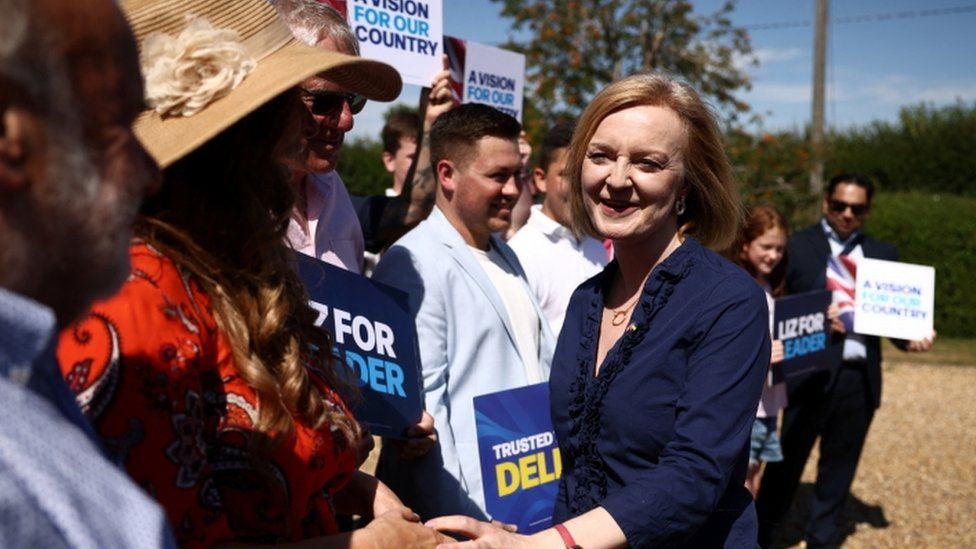ARTICLE AD BOX
By Paul Seddon
Politics reporter
 Image source, Reuters
Image source, Reuters
Opinion polls suggest Liz Truss has a headstart in the race to become the UK's next PM.
Liz Truss is ahead of Rishi Sunak in the race to be next Conservative leader and prime minister, in polls of party members. But how accurate are these polls and who carries them out?
Several polling companies have released surveys of what Tory voters and the public think of the contenders.
But only two organisations have asked Tory members themselves, the only people who get a vote in this contest.
They are YouGov, one of the UK's biggest polling companies, and ConservativeHome, a popular website among Tory activists.
What do the YouGov polls say?
YouGov has so far released one voting intention poll of Tory members since the run-off between Ms Truss and Mr Sunak was confirmed on 20 July.
The survey said Foreign Secretary Ms Truss was the favoured choice of 49% of respondents, compared to 31% for former chancellor Mr Sunak, with 15% saying they didn't know and 6% not intending to vote.
Once "don't knows" and those not intending to take part are excluded, this gave her a sizeable 24-point lead.
Previous YouGov surveys of Tory members, conducted when more candidates were still in the race, also suggested she would win a run-off with Mr Sunak.
The surveys have suggested Ms Truss's lead among Leave-voting Tory members is bigger - despite the fact that, unlike Mr Sunak, she campaigned for Remain at the 2016 referendum.
Aside from voting intention, YouGov has also polled Tory members on what qualities they want to see in their next leader, what policies they want them to pursue, and how they performed at the first head-to-head debate on the BBC.
What about ConservativeHome?
ConservativeHome is yet to publish a survey since the leadership contest narrowed to two.
It has, however, conducted several surveys when a number of contenders were still in the race, including hypothetical run-offs between different candidates.
These run-off surveys have also suggested Ms Truss would beat Mr Sunak in a straight head-to-head.
Its latest review, when five candidates remained, placed Ms Truss second, behind now-eliminated Kemi Badenoch.
Mr Sunak came third, behind Penny Mordaunt - whom Ms Truss narrowly beat into the run-off vote - and Tom Tugendhat.
How do the polls work?
YouGov conducts its Tory membership polling online, from those volunteers in its database who say they are Tory party members.
The results from these surveys, typically with 800-900 respondents, are then weighted to reflect the makeup of the membership - which research shows is older, whiter and more middle class than the rest of the population.
ConservativeHome also conducts its surveys online. It has a survey panel of more than 3,300 Tory members, which it has been using to run monthly surveys about what party activists are thinking for more than 15 years.
Its leadership surveys in the contest so far have also tended to have around 800-900 participants. Unlike the YouGov polls, however, the results are unweighted.
Image source, PA Media
Image caption,Some opinion polling has focused on the candidates' performance in TV debates.
Are these polls reliable?
Accurately weighting the results of party membership polls is trickier, as the party itself does not publish data on its membership.
This marks a contrast with polling of the general public, where there is a wealth of official information for pollsters to use.
However, party members are more politically engaged, reducing the chance of people saying they don't know how they will vote.
The electorate is also much smaller - there are believed to be around 160,000 members, about 0.3% of the total UK electorate - meaning a survey with hundreds of respondents covers a much bigger proportion of the voter base.
To date, there have only been three Tory leadership elections where members have voted since the current system was introduced. There was limited polling at the first two of these, in 2001 and 2005.
In 2019, YouGov accurately predicted Boris Johnson's victory, albeit both the member polls it ran during the campaign gave him bigger leads than the 66.4% vote share he eventually received.
ConservativeHome also predicted Mr Johnson would win, across three surveys during his head-to-head contest with Jeremy Hunt. Two of its polls also gave the outgoing PM a bigger lead than he eventually had.
But one, conducted as ballot papers were going out, came pretty close to predicting his eventual margin of victory. ConservativeHome editor Paul Goodman says that is why his website's poll is so closely watched by the media.
When will we know?
Tory party members will receive postal ballots between 1-5 August, and a set of codes also allowing them to vote online.
Members will get one vote each - with the party saying if they vote again, it is only the last vote that will count.
They will have until 5pm on Friday 2 September to return their ballots. The result will be announced on Monday, 5 September.

 2 years ago
23
2 years ago
23








 English (US) ·
English (US) ·